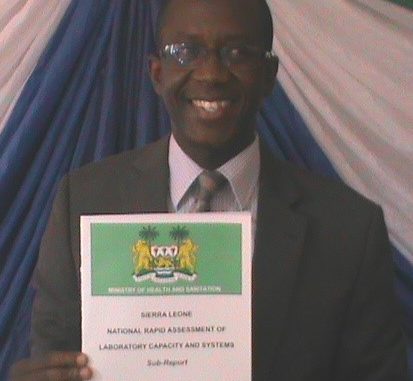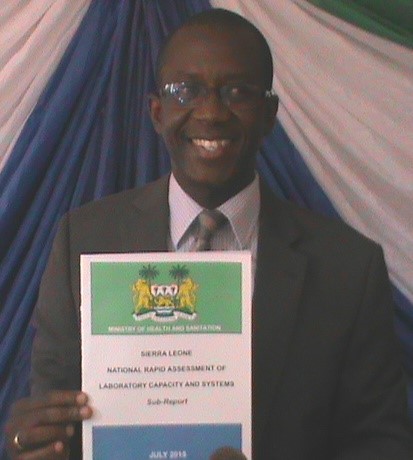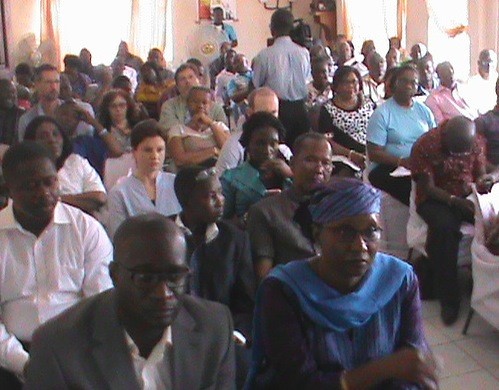
By Kadrie Koroma and Augusta Koroma
Freetown, April, 7, 016 (MOHS) – Health and Sanitation Minister, Dr. Abu Bakarr Fofanah has said that a strong, responsive and functional health system would help detect, control and prevent future public health outbreaks.

Health and Sanitation Minister, Dr. Abu Bakarr Fofanah launching the Report
Launching the Rapid Laboratory Assessment Report and Sierra Leone Clinical Laboratory Operating Procedures at the Grassroots Gender Empowerment Movement (GGEM) hall in Freetown, Dr. Abu Bakarr Fofanah reiterated that an accurate and reliable diagnosis is the corner stone of disease prevention, management and control, adding that laboratories provide the bulk of available diagnostic techniques and are indispensable in health care delivery.

Cross section of the audience
He told his audience that a functional and effective national laboratory structure and network requires the guidance, support and regulation of a well laid down policies, adding that a reliable and properly organized laboratory system not only generates information critical to individual case management but also to disease surveillance and control.
The Health Minister disclosed that in a bid to strengthen Sierra Leone’s medical diagnostic laboratory service, the Ministry of Health has initiated a review of the National Laboratory Strategic Plan (2011-2015) that will provide a framework for strengthening laboratory services in the country.
To ensure that the laboratory review is informed by current evidence and the prevailing context in Sierra Leone, Dr. Fofanah said a Rapid Assessment of Laboratory Capacity and System was undertaken by the Directorate of Hospitals and Laboratory Services, with technical support from Options Consultancy Services and funded through the UK Department for International Development (DFID).
The findings he said provide an insight into existing laboratory capacity in the country, and factors that need to be addressed for the long-term improvement of the laboratory system. The Report he added will help contribute to the continued aim of building a more resilient health system in Sierra Leone.
The Health Minister commended the leadership provided by the Directorate of Hospitals and Laboratory Services, and thanked all partners that supported the development of the document, noting that the document will serve as an essential resource in developing a National Laboratory Strategic Plan, which when implemented, will benefit the health sector and wellbeing of the people of Sierra Leone.
In a joint presentation, the Director of Hospitals and Laboratory Services, Dr. Victor Matt Lebby and the Manager, National Laboratory Services, Dr. Abdul Kamara highlighted the strengths, weaknesses and opportunities during their findings and assessment analysis.
He said, the availability of clinical laboratories in all district hospitals and many Community Health Centres has ensures that diagnostic testing service are available across the country.
Dr. Lebby opined that there is a need for an authoritative body that sets minimum standards and regulates laboratories noting that the current systems for laboratory registration and licensing procedures are weak.
The Permanent Secretary and Chairman for the occasion, Mr. David Banya in his remarks described the event as historic in an era of challenges, ideas and innovations.
He disclosed that resource constraints had been a huge barrier to the strengthening and improvement of laboratories in the country, pointing out that the status quo at the time of the Ebola outbreak affected the healthcare system and human resource capacity.
Mr. Banya maintained that with concerted efforts with partners like WHO, DFID and others, resources were injected into laboratory services that have given a new lease of life with a propensity for future improvement.
He encouraged all those connected with the development of the Rapid Laboratory Assessment Report to endeavor to put time, energy and commitment into it with a view to maximizing the gains.
Dilating on the recommendations, the Manager, National Laboratory Services, Dr. Abdul Kamara recommended that human resource system for laboratory personnel need to be strengthening, including the provision of high-quality training programmes for all levels of laboratory staff to enable the country to become self-sufficient in generating laboratory personnel at all level.
He said Bio Safety Policies and procedures should be established and laboratories be able to comply with these policies to ensure the safety of medical laboratory personnel, the communities and environment surroundings, adding that laboratory supply chain system needs strengthening to prevent interruption of service as a result of insufficient equipment. Laboratory funding mechanisms Dr. Kamara said, needs to be strengthened and coordinated, and investment decision informed by, and channeled to priority needs.
In his remarks, Options Country Representative, Dr. Mohamed Yilla said the story of laboratory in Sierra Leone has always demonstrated selfless individuals with unflinching commitments working under very resource limited conditions to bring health care to the people.
He noted that few years ago, the Ministry of Health in its wisdom developed a national strategic plan for laboratory, blood services and a basic package of essential health services which today are central to galvanizing the Ministry’s approach to build back better laboratory services.
Dr. Yilla reiterated that together with the Ministry of Health and their donor, DFID, they recognized that laboratory services are critical for the delivery of the basic package of essential health services along with the President’s two priorities of resilient zero and saving lives of mothers and children.
He registered Options continued support to the Ministry of Health to improve laboratory services through better coordination, data for decision making and flexible technical support.
KK/AK/MOHS/SLENA



